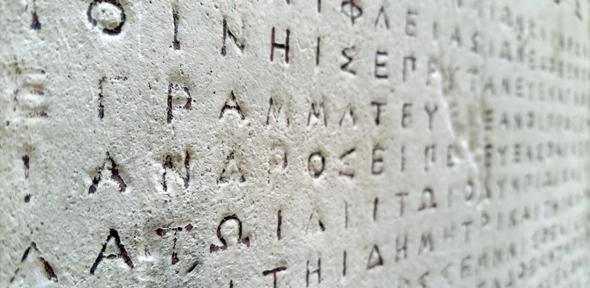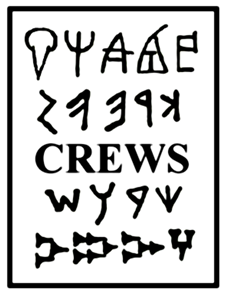
How to apply for the CREWS PhD Classics Studentship at Cambridge
PhD Studentship on the Early Greek Alphabet
Further Details
The Faculty of Classics, University of Cambridge, is pleased to announce a fixed term fully-funded PhD Studentship on the European Research Council funded Project Contexts of and Relations between Early Writing Systems (CREWS). The studentship will run from 1st October 2016 to 30th September 2019.
The CREWS Project
Contexts of and Relations between Early Writing Systems (CREWS) is a European Research Council funded project hosted at the Faculty of Classics, Cambridge, and led by the Principal Investigator, Dr Philippa Steele. It will run from April 2016 to March 2021, with a four-person research team comprising the Principal Investigator, two research associates and the PhD student.
 The aim of the CREWS project is to take an innovative and interdisciplinary approach to the history of writing, developing new methodologies for studying writing systems and their social context. The project researchers will be working on specific case studies relating to inscriptions of the ancient Aegean, Eastern Mediterranean and Levant (c.2000-600 BC). By looking at the ways in which writing systems were developed and used, the project will investigate the systems themselves and the languages written in them, as well as the cultural settings in which they were adapted and maintained.
The aim of the CREWS project is to take an innovative and interdisciplinary approach to the history of writing, developing new methodologies for studying writing systems and their social context. The project researchers will be working on specific case studies relating to inscriptions of the ancient Aegean, Eastern Mediterranean and Levant (c.2000-600 BC). By looking at the ways in which writing systems were developed and used, the project will investigate the systems themselves and the languages written in them, as well as the cultural settings in which they were adapted and maintained.
By focusing on the Mediterranean in 2nd and 1st millennia BC, the project will investigate writing during a period when we know there were high levels of contact between different areas. Against this backdrop of linguistic and cultural interconnections, the project will study how writing was passed on and adapted for new uses, which also has the potential to give new insights into social history.
For further details, see the CREWS Project blog: https://crewsproject.wordpress.com/
PhD Studentship
The PhD student will prepare a doctoral dissertation concentrating on the early development of the Greek alphabet, working with the increasing corpus of alphabetic inscriptions dating from the 8th to early 6th centuries BCE.
The creation of the Greek alphabet (adapted from the Phoenician abjad by the mid-8th century BC) has traditionally been viewed as an event triggered by contact between Greek and Phoenician speakers, and possibly by an impetus to write down parts of the ‘literary’ (or ‘Homeric’) tradition that up to that point had existed only as a long-standing oral tradition. The discovery of considerable numbers of early Greek alphabetic inscriptions in recent years has provided a great deal of new information on the early stages of the script that has yet to be analysed fully. For example, recent finds from sites such as Methone, Eretria and Kommos have produced inscriptions that often look much more mundane than more famous texts like the Nestor’s Cup and the Dipylon Oenochoe inscriptions that have underpinned theories about literary origins of the alphabet. Recent developments in archaeological research on mobility and contact across the Greek-speaking world are also relevant to understanding the early development and spread of the alphabet.
The PhD student’s research will take into account recent discoveries and aim to analyse the form, function and distribution of early Greek alphabetic inscriptions in order to reassess the nature of literacy at this time and to illuminate the processes by which the script was adapted and proliferated. Some freedom will be allowed to allow the student to take an independent approach to the specified material, and applicants should describe the way in which they would aim to tackle the PhD topic in the research proposal submitted as part of the application.
The successful applicant will be supervised by Dr Philippa Steele and co-supervised by Professor James Clackson, and will be part of a project research team comprising Dr Steele as Principal Investigator and two research associates (currently being recruited). The PhD student will be further required to meet the same formal requirements as all other PhD students in the Faculty of Classics, undergoing a registration assessment for the PhD in the first year of study, and progress reviews with senior members of the Faculty in a related subject area annually, or more frequently if there is any cause for concern raised by one of the supervisors. S/he will also be expected to participate in project team meetings and other project activities and will be a member of the Classics Faculty’s ‘E’ (Linguistics) Caucus.
Applications
Due to restrictions of funding, the studentship is only available to UK/EU citizens. The award will pay full fees and maintenance for the period of the scholarship (this includes the maintenance costs of a successful applicant who is a UK/EU citizen).
The successful applicant is expected to have Masters’ level experience in ancient Greek epigraphy and/or linguistics (by October 2016), and a proven record of outstanding achievement at both undergraduate and Master’s level. S/he will have an excellent command of ancient Greek, and should by the time of taking up the studentship have some experience of working with epigraphic material. Some knowledge of Phoenician would also be advantageous but is not expected as guidance will be given on handling Phoenician epigraphic material during the studentship. If the successful applicant does not have English as her/his first language he/she must also meet the Faculty’s requirements for competence in the English language.
Further information on Cambridge's PhD in Classics may also be found here.
Application process
Due to the special nature of this research project, applications should be made directly to the Classics Faculty, and not to the Cambridge Graduate Admissions Office. Applications should include:
- A completed Graduate Application Form (GRADSAF), available for download here.
- Transcripts of results from your masters and undergraduate degrees.
- A research proposal describing your relevant experience and the approach you would take to the specified PhD project if successful (up to a maximum of 1,000 words).
- Sample(s) of written work (1-2 pieces, up to a maximum of 10,000 words).
- Two academic references (see below).
- Evidence of an acceptable English Language qualification (if English is not your first language).
For advice on completing the application form (GRADSAF) please see here.
These materials should be sent directly by e-mail to graduate.secretary@classics.cam.ac.uk by 12.00 noon on Monday 23rd May. Late applications will not be considered.
Applicants should ask their two referees to send references directly to the Classics Faculty (graduate.secretary@classics.cam.ac.uk) by the same deadline. It is the applicant’s responsibility to ensure that the references are received by the closing date.
The selection process will take place between late May and mid-June. Shortlisted candidates will be notified by Wednesday 1st June and invited to an interview to be held in the week commencing on Monday 13th June.
